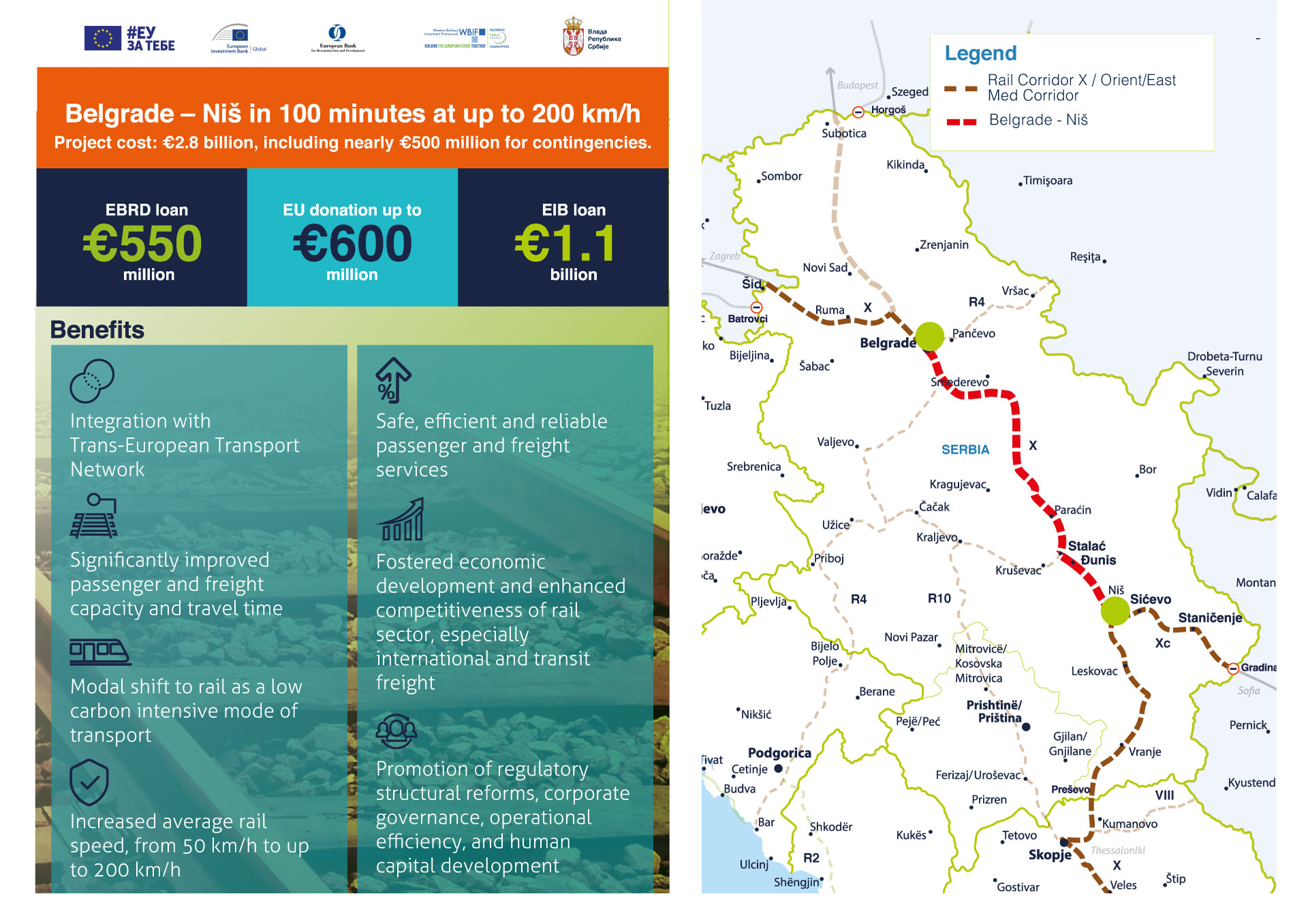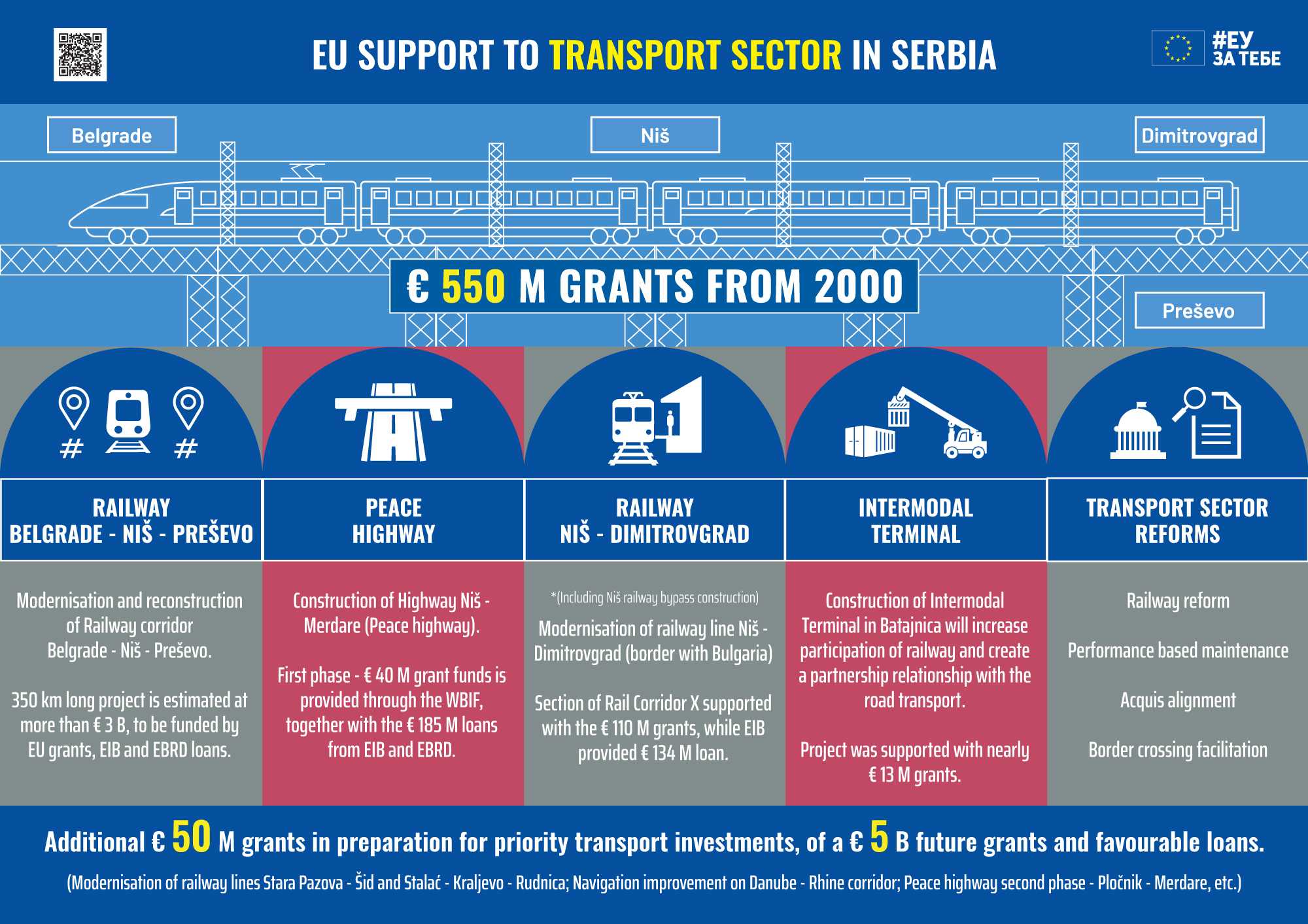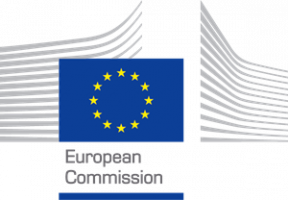About Sector
Serbia and the EU are currently working on the modernization of the railway Corridor X, for which a €2.8 billion financial package (including nearly €500 for contingencies) was announced. The package supports upgrade of the Belgrade - Niš section of Railway Corridor X, which will allow fast train connection of up to 200km/h between the two cities enabling faster flow of goods and services as well as contribute to the speedy integration into the EU railway networks.

The package consists of an investment grant of up to €600 million from the EU – the largest EU grant donation for a single project in Serbia to date; a €1.1 billion loan from the EIB and a €550 million EBRD loan. The EU has already approved €265 million worth grants and the first tranche amounting to €82.8 million was sealed in a symbolical signature event onboard a train from Belgrade towards Niš.
The European Union supports Serbia through railway and road infrastructure construction projects, modernization of waterways, as well as the transport sector reform support.
One of the key infrastructure projects is the Modernization and reconstruction of Railway corridor from Belgrade – Niš – Preševo (border with North Macedonia). This important 350 km long project will be implemented in sections; overall costs is estimated at more than EUR 3 billion. This project will be funded by EU grant funds, as well as advantageous EIB and EBRD loans.

Another very important project for the railway improvement in Serbia is the Modernization of railway line Niš – Dimitrovgrad (border with Bulgaria). This is one of the priority projects supported with the EUR 110 million in grant funding. This project is essential for electrification of this important section of Rail Corridor X which so far has not been electrified. The successful implementation of this project would significantly contribute to the improvement of railway operations and the reduction of pollution.
Today, the EU is supporting Serbia in building crucial new roads. In December 2021, construction began on the Niš-Merdare highway (the Peace Highway), with the first section completed in July 2023. This highway will enhance the socio-economic development of the entire region and contribute to faster and safer movement of goods and people, and it will also improve security of supply and market integration. For the construction of the first phase, from Niš to Pločnik (34 km), EUR 40 million grant funds were provided through the Western Balkans Investment Framework (WBIF), together with EUR 185 million loans from EIB and EBRD.
The finalization of the Intermodal Terminal in Batajnica construction
in the vicinity of Belgrade is also underway. This significant project is supported by the EU with almost EUR 13 million in grants. Belgrade is getting an intermodal terminal that will boost development of a modern combined transport of goods by increasing participation of railway and creating a partnership with the road transport.
Water transport projects recognize the enormous potential of the European Corridor VII (Danube river) and are aimed at implementing strict safety rules, reducing the risk of navigation accidents and reducing the negative environmental impact. River navigation along the river Danube is much easier after the completion of works in 2021 on one of the navigation locks at the Đerdap Dam. The locks at the dam Đerdap I was modernized with the help of EU grants in the amount of EUR 11.4 million, while works are underway on the renovation of the Đerdap II navigation locks financed by the EU in the amount of EUR 17 million. Thanks to the support of the EU, navigation on inland waterways in Serbia is monitored in real time through the river information service system (RIS), managed by the Directorate for Inland Waterways “Plovput”. The Project to remove sunken ships, which have been lying at the bottom of the Danube for more than seven decades, is financed with EUR 16.55 million of EU grants approved through the Western Balkans Investment Framework (WBIF) and extremely favourable loan from the European Investment Bank (EIB), in cooperation with the Government of Serbia. The investment was recognized as the Flagship project of sustainable transport of the Western Balkans Investment Framework (WBIF) 2022. Removal of the sunken ships began in September 2024.
An important part of the support provided by the EU to the Serbian transport sector is the promotion and support for the development of sustainable urban mobility and connectivity, which includes cross-border cooperation projects and the construction of bicycle and pedestrian lanes. Every year, Serbia participates in the European Mobility Week, which promotes clean, smart and sustainable transport system. After the events, every year in the cities and municipalities in Serbia, permanent infrastructure improvements and modern solutions for mobility without exhaust gases remain in use, such as bicycle stations, newly built lanes and access to people with disabilities.
Following the catastrophic floods in 2014, 73 new bridges were built on the territory of 28 local self-governments with grants from the EU Solidarity Fund. With the support of the EU, some of the most important bridges in Serbia were built and reconstructed. The new Žeželj Bridge in Novi Sad, 474 meters long, for which the EU allocated EUR 35.3 million in grants. With the help of EUR 40 million of grants from the European Development Agency, the Freedom Bridge in Novi Sad was also reconstructed.
The European Union is working with Serbia on the preparation of the project Modernization of Railway Lines Belgrade – Šid and Stalać – Kraljevo – Rudnica. Works are also underway on the second phase of the Peace Highway (Pločnik – Merdare), while the project to improve navigation conditions on the Danube – Rhine Corridor is ongoing. The reconstruction of the local road network in accordance with modern principles of environmental protection and climate change standards is also being prepared, and the EU finances the preparation of documentation for the pilot sections, while the first investment phase is expected to be financed in the amount of EUR 100 million from EIB and EBRD funds. Noteworthy, the needs for improvement of the local road infrastructure in accordance with modern standards are estimated at more than EUR 1 billion.
List of key local partners/organisations
- Ministry of European Integration
- Ministry of finance
- Ministry of Construction, Transport and Infrastructure
- Minister without portfolio for Regional Development
Projects in the transport sector funded by the EU in Serbia aim to
improve transport connectivity, and thus better economic integration within the
region and integration of the region with the EU. In addition, the efforts that
the EU invests in the transport sector through these projects are largely
focused on market opening and the implementation of the EU standards. Projects
funded by the EU have significantly contributed to the railway reform process,
the introduction of modern and most cost-effective road transport
infrastructure maintenance practices, and the introduction of a river
information system in order to improve navigability on the inland waterways of
Serbia.
From 2000 to this day, EU
support to the transport sector in Serbia has reached more than EUR 550 million
in grants. In addition, more than EUR 50 million of EU grants have been set
aside for the preparation of strategic priority investments in the field of
transport, with a total value exceeding EUR 5 billion, which will be realized
as a combination of EU grants and favorable loans in the future.


